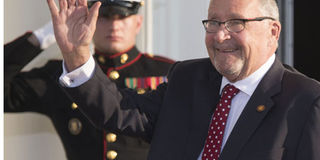Zambia’s acting leader in pledge

Zambian Vice President Guy Scott waving upon his arrival at the White House for a group dinner during the US Africa Leaders Summit on August 5, 2014. Scott, Zambia's acting President, addressed the nation on October 29, 2014 following the death of President Michael Sata pledging to respect the constitution. FILE PHOTO | AFP
What you need to know:
- He said elections will be held within 90 days and pledged to honour the Constitution during the address carried on state TV.
- Mr Sata, nicknamed “King Cobra” for his biting rhetoric, had ruled Zambia since elections in 2011.
- Sata flew to London just over a week ago for treatment, appointing Mr Lungu as acting president. Mr Scott, 70 — whose parents are Scottish — is the first white person to lead an African country since FW de Klerk ruled apartheid South Africa.
LUSAKA
Zambia’s acting President Guy Scott addressed the nation late on Wednesday following the death of that country’s President Michael Sata pledging to respect the constitution.
He said: “Lets grieve and support each other during this difficult moment.”
He said elections will be held within 90 days and pledged to honour the Constitution during the address carried on state TV.
Scott announced that national mourning had begun for the southern African nation of 14 million people.
Earlier on Wednesday Cabinet Secretary Roland Msiska said in an address to the nation: “It is with a heavy heart that I announce the passing on of our beloved president.’’
He called for Zambians to remain calm.
Mr Sata, nicknamed “King Cobra” for his biting rhetoric, had ruled Zambia since elections in 2011.
He had long been rumoured to be seriously ill, despite fervent government denials.
SHCOCKED BY NEWS
Mr Msiska said Sata died on Tuesday in London’s private King Edward VII hospital.
Mr Sata had not been seen in public since returning from the UN General Assembly last month, where he failed to make a scheduled speech.
He made a rare public appearance on September 19 to tell parliament: “I am not dead.”
Zambia’s former President Rupiah Banda told AFP he was shocked by the news of his successor’s death.
“It’s really sad considering we were not quite sure of how he was doing, but we have just heard about his passing on.”
Vice President Scott was named acting President, Defence and Justice minister Edgar Lungu said.
“Dr Scott will act as president of the Republic of Zambia until the country goes for a presidential by election” said Mr Lungu, announcing the appointment of Africa’s first white leader since South Africa’s FW de Klerk.
POWER STRUGGLE
Mr Sata’s death prompted speculation about who may replace him before and after elections, which are expected within 90 days.
Long before Sata’s death, analysts had said a power struggle for Zambia’s top job was already well under way.
Sata flew to London just over a week ago for treatment, appointing Mr Lungu as acting president. Mr Scott, 70 — whose parents are Scottish — is the first white person to lead an African country since FW de Klerk ruled apartheid South Africa.
Mr Banda said Zambia went through similar uncertainty when president Levy Mwanawasa died abroad in 2008.
“We went through this in the past but we maintained peace and I hope we will remain peaceful.”
African leaders paid tribute to Mr Sata.
Kenya’s President Uhuru Kenyatta hailed Sata as an “outstanding son of Africa”.
“He was gifted with unique, admirable abilities and strong values,” he said in a statement.
Sata’s supporters saw him as a no-nonsense man of action, while for critics, the former policeman, trade unionist and taxidermist was an authoritarian populist.
"KING COBRA"
What is undisputed is that he seemed to revel in scorched earth politics. Mr Sata rode to power on the back of resentment against the Chinese resource firms that dot Zambia, describing them as “infesters”.
Detractors, political foes, the media and even allies frequently came under attack from a man who earned the sobriquet “King Cobra”.
His government had recently cracked down on political opponents and critical journalists who reported on his long-suspected illness and frequent “working trips” abroad, apparently for medical treatment.
In January 2014, an opposition politician was charged with defamation for calling him a potato, while in June the authorities charged three opposition activists for claiming that he was dying.
Born on July 6, 1937 in the Mpika district in the north of the then-British colony of Northern Rhodesia, Michael Chilufya Sata had little formal education.
IMPRISONED
After basic schooling he joined a seminary, with a view to joining the priesthood, according to Zambian historian Field Ruwe. But it was not to be, and he instead entered the police force.
Sata was later arrested. The reason is subject to some controversy — Sata claimed he was jailed for his involvement in the independence fight, while adversaries claim it was for a criminal offence.
On his release he became involved in politics via the trade union movement.
After a period in Britain — where he at one stage cleaned railway stations — and some time spent in business as a board member of a taxidermy firm, he became more firmly involved with the United National Independence Party.
Years as a party apparatchik earned the Catholic father of eight the governorship of the capital, Lusaka, under Zambia’s first president, Kenneth Kaunda.




